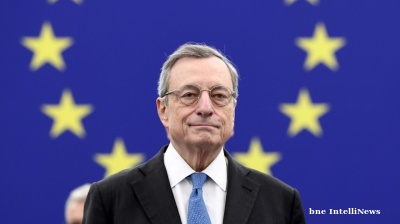Every morning, as millions of caffeine-deprived, peckish Poles set out to tackle their daily errands, they find a brief sanctuary beneath the gleaming green sign of Zabka—Polish for “little frog.”
As they pick up their coffees and sandwiches, along with an eclectic mix of items ranging from their favourite weekly magazine to pet food, and perhaps a shot of vodka or a deep-frozen pizza, their choices will influence the performance of the latest company to go public on the Warsaw Stock Exchange.
The Polish convenience store chain Zabka is set to make a significant mark on the Polish stock market on October 17 with its PLN6.45bn (€1.5bn) initial public offering (IPO), which has put the company’s value at a whopping PLN21.5bn.
This places Zabka among the largest IPOs in Poland in recent years, second only to the e-commerce giant Allegro’s PLN9.2bn listing in 2020. The interest from retail investors is even bigger than in Allegro’s case, with demand so high that it resulted in a reduction in retail allocations just exceeding 90%.
Existing shareholders plan to sell up to 345mn shares, including 45mn as part of an over-allotment option. Out of the total number, individual investors will receive 15mn shares, representing 4.4% of the offering, with the remainder allocated to institutional investors.
The sale of existing shares includes approximately 266mn shares from Heket Topco, a company controlled by the CVC private equity fund – which took over Zabka from Mid Europa Partners (another PE fund) in 2017 – as well as shares from PG Investment Company, the European Bank for Reconstruction and Development, and former company managers.
At every corner
Zabka is ubiquitous in Poland. The store chain operates over 10,500 locations across the country, a compelling entry point for investors in a market where consumer spending is outpacing Western Europe, driving Poland’s economic growth.
The market is far from the saturation point, judging from the plans Zabka revealed in the run-up to the IPO. The company is planning to open approximately 1,100 new stores in 2024 alone, with a long-term goal of expanding to a total of 14,500 locations by 2028.
Looking ahead, Zabka aims for a high single-digit increase in like-for-like sales in 2024, targeting a growth rate between 7.5% and 9%. In the medium term, the company is focused on maintaining an average to high single-digit growth rate alongside an adjusted Ebitda margin increase, aspiring to reach the upper end of the 12-13% range. Expectations for improved adjusted net profit margins are set at approximately 4.5%.
Between 2021 and 2023, Zabka achieved an impressive compound annual growth rate (CAGR) of more than 25% in sales to end customers, alongside a 19% CAGR in adjusted Ebitda. In 2023, sales surged by 23% to PLN22.76bn, while growing 21.5% y/y to PLN12.9bn up until the end of June.
Sunday trade and prohibition
As the countdown to the IPO is about to end, analysts point to a mix of risks and opportunities ahead of the company that are related to evolving regulations in Poland, a recent analysis by the Polish newspaper Puls Biznesu noted.
Many Zabka stores currently benefit from Sunday trading exemptions due to their franchise model, allowing them to operate when the owner is present. Legislative changes restoring retail trade on Sundays could permit competitors – like discount supermarkets giants Lidl or Biedronka – to open on Sundays, potentially impacting foot traffic at Zabka stores.
While stores under 200 square meters – which is precisely the Zabka segment – will not be required to collect returnable bottles or cans under the coming changes to Poland’s packaging waste collection and recycling regulations, a lack of recycling facilities at Zabka stores could negatively impact sales. If Poland's deposit system requires Zabka to invest in infrastructure, it could present the chain with operational challenges and costs.
The political debate on restrictions on late-night sales of alcohol could also affect Zabka’s evening business, as alcohol and cigarettes account for about 20% of transactions.
With the planned increase in Poland’s minimum wage by 2025, labour costs for franchisees may rise, leading to potential price hikes, though the company’s strength lies in convenience – cue the sheer number of stores in operation – rather than pricing. While increased purchasing power could enhance sales, rising excise taxes on cigarettes and alcohol through 2027 may negatively impact demand for these key categories.
Stonks!
Analysts downplay the risks – see many of them as only being hypothetical anyway – and are overwhelmingly optimistic ahead of Zabka's debut in Warsaw, predicting significant stock price increases. Nearly 92% of analysts polled by the bankier.pl website expect the stock price to rise, with over half anticipating a gain of at least 10% on the first day of trading.
The IPO could also mark a historic moment for the Warsaw bourse, potentially setting records for single-day trading volumes. If trading volume surpasses the current record of PLN5.1 billion set by the state-controlled insurer PZU, it would enhance Zabka's chances of inclusion in the blue-chip WIG-20 index. The average first-day return for recent IPOs stands at 14.3%.
Zabka's IPO could also prompt other offerings, including the Croatian grocery chain Studenac and the medical laboratory Diagnostyka. Companies like art dealership Desa and e-commerce specialists Oferteo are also considering going public.
The franchise controversies
Investors’ and analysts’ enthusiasm aside, Zabka has long been under fire for thei way it treats its franchisees. The company’s allegedly super tight regulations on how to run the stores, claim SAIF, an association of franchisees, result in franchisees being overworked and often giving up after just weeks behind the counter.
The Polish government has vowed to return to scrutinising franchise regulations after media criticism that it had disbanded a team at the office of the spokesperson of small and medium enterprises tasked with working out solutions to end “unchecked franchising”.
Still, details on what the renewed scrutiny will focus on, what it might recommend for change and when, are unclear.
Features

Russian e-commerce giant Wildberries goes on a mysterious M&A spree
Russian e-commerce giant goes on M&A spree Almost a year after the controversial merger with a leading outdoor advertising firm, Russia’s leading e-commerce site Wildberries is indulging in a fresh bout of eyebrow raising deals.

US expands oil sanctions on Russia
US President Donald Trump imposed his first sanctions on Russia’s two largest oil companies on October 22, the state-owned Rosneft and the privately-owned Lukoil in the latest flip flop by the US president.

Draghi urges ‘pragmatic federalism’ as EU faces defeat in Ukraine and economic crises
The European Union must embrace “pragmatic federalism” to respond to mounting global and internal challenges, said former Italian prime minister Mario Draghi of Europe’s failure to face an accelerating slide into irrelevance.

US denies negotiating with China over Taiwan, as Beijing presses for reunification
Marco Rubio, the US Secretary of State, told reporters that the administration of Donald Trump is not contemplating any agreement that would compromise Taiwan’s status.




